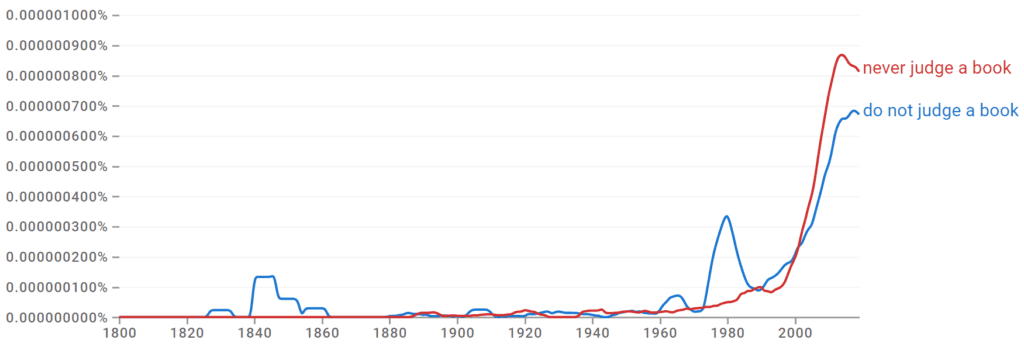Good advice comes in all shapes and sizes. You should take that to heart if you have ever been told to never judge a book by its cover.
In short, this phrase means to avoid passing judgment on something or someone based on appearances. I share this information with my students but also let them know that certain scenarios, such as interviews, can’t help but make an assumption based on appearances.
Let’s take a closer look at the origins of this phrase and how to use it both literally and figuratively to make your point.
What Is the Meaning of Don’t Judge a Book by Its Cover?

Don’t judge a book by its cover is an admonishment to not judge someone or something simply on appearances. The term has strong literal uses that are easy to apply in a figurative sense to create analogies and help clarify the point you may be trying to make.
For example:
- I know her look is not the one you are searching for to represent the brand, but do me a favor and avoid judging the book by the cover; interview her first before you make a decision. I think you might be pleasantly surprised.
- Despite his uncouth appearance and noticeable tattoos, I’m glad I know not to judge a book by its cover because he is the absolute best person you may ever meet.
- Although the company’s story for the insurance claim sounded questionable, I’ve never judged a book by its cover and always taken the time to verify issues. It actually helped turn up even more damage than they knew about. They saved their business, and I have new clients for life.
Proverb or Idiom?
Some people claim that the saying never judge a book by its cover is a proverb. Others say it’s an idiom. This argument is likely never to be resolved as it can be one or the other, or both.
A proverb is a short phrase recognized in general use that offers good advice. Proverbs are traditionally attributed to a story of some type that offers a guideline of how to live well. “Never judge a book by its cover” isn’t associated with any one story, but it is good advice that should be followed. But is it a proverb? You decide.
An idiom is a word or phrase that has taken on a meaning other than its literal use. To avoid judging a book by its cover definitely falls in this category since the term is regularly applied to many objects (people included) that are not books. The phrase is used to create an analogy that whatever subject it is being applied to should not be judged in advance and that you should first get to know a bit more about it (or them) before coming to a conclusion.
Don’t Judge a Book vs. Never Judge a Book

If you are wondering which of the above phrases is correct, take to heart that neither one nor the others are considered better. Both phrases are correct and can be used interchangeably for proper grammatical purposes. In fact, to “never judge a book by its cover” is most similar to the modern use of the term first appearing in print in the 1940s. More information on that is listed below.
What Are the Origins of Never Judge a Book by Its Cover?
The entire premise behind the term is to point out that a book cover or illustration is hardly the means to judge a good story. This is a lesson any bibliophile learns early on. It also is easy to apply in just about any scenario.
The expression “don’t judge a book by its cover,” sometimes rendered as you can’t judge a book by its cover, is traced to the novel The Mill on the Floss, written by George Eliot in 1860. In the novel, the reference is to a physical book when the character, Mr. Tulliver, uses it when discussing Daniel Defoe’s The History of the Devil:
- “and there’s a lot more of ’em, sermons mostly, I think, but they’ve all got the same covers, and I thought they were all o’ one sample, as you may say. But it seems one mustn’t judge by the outside.”
The modern version of the phrase appears in 1946 in Edwin Rolfe and Lester Fuller’s murder mystery, Murder in the Glass Room:
- “You can never tell a book by its cover.”
Let’s Review
Whether you want to argue the phrase “never judge a book by its cover” as a proverb, idiom, or both, the meaning never changes. Use this phrase to explain that one should never pass judgment on someone or something based on initial impressions or appearance. And that you should perhaps spend more time gathering information or getting to know someone before having an opinion.
Don’t judge a book by its cover is an admonishment to not judge someone or something simply on appearances.
Enjoyed reading about proverbs? Check out some others we covered:
